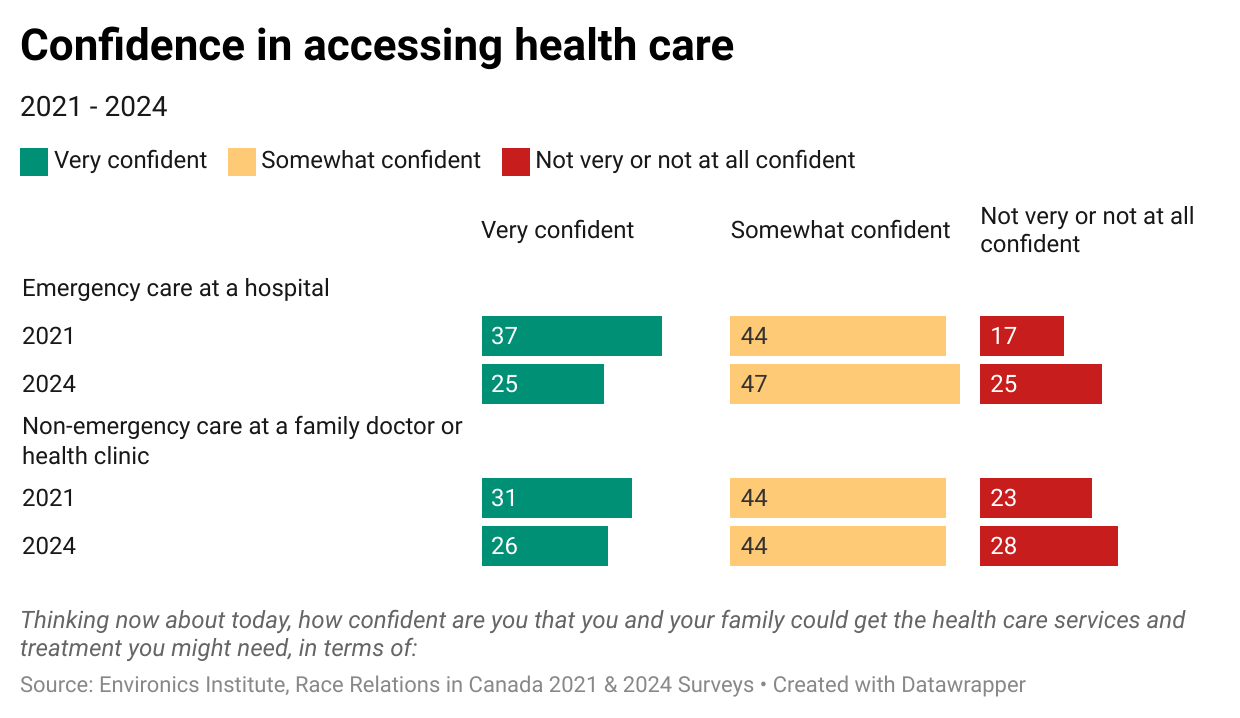Can you get health care when you need it?
The issue we will be talking about once we’re no longer talking about tariffs
If we weren’t currently focused on tariffs and threats of annexation, what would we be talking about?
The answer appears obvious: the cost of living has continued to be a top public concern even after the start of the trade war with the United States. But health care would likely also be high up on the political agenda – and here’s why.
The recently-released Race Relations in Canada 2024 survey asked Canadians how confident they are that they and their family could get the health care services and treatment they need, in terms of both emergency care, and non-emergency care from a family doctor or clinic. The same question was asked in an earlier edition of the survey in 2021. The results show a significant loss of confidence over the past three years.
The proportion of Canadians who are very confident that they could access emergency care at a hospital fell from 37 percent in 2021 to 25 percent in 2024.
The proportion who are very confident that they could access care from a family doctor or a health care clinic fell from 31 percent in 2021 to 26 percent in 2024.
Most Canadians continue to feel at least somewhat confident that they could access the care they need, but less so in 2024 than in 2021.
The 12-point drop in the proportion that feel very confident about getting emergency care is clearly the most striking result. The drop is evident across all population groups, including both men and women, all age groups and all regions. However, the extent of this drop is higher among seniors (from 44% in 2021 to 26% in 2024). It is also higher than average in Atlantic Canada (21 points) and British Columbia (20 points).
The overall five-point drop in confidence in accessing care from a family doctor is less dramatic, but as the next chart shows, this is because there was almost no change in Quebec and Ontario, where confidence was previously lower than elsewhere. But this level of confidence is down 11 points in B.C., 12 points in Alberta and 17 points in Atlantic Canada.
One more finding caught my eye. Confidence in accessing health care services and treatment varies by income – highest for those who describe their household income as “good enough for you and you can save from it,” and lowest for those whose income is “not enough for you and you are having a hard time.” In this case, it’s not the change between 2021 and 2024 that stands out as much as the difference across income groups in both surveys – illustrated in the following chart about access to a family doctor or health care clinic.
The survey measures perceptions and not experiences: it could be that Canadians with more comfortable incomes simply have more confidence in our public institutions in general.
That said, the survey findings remain important, for two reasons. First, lower-income Canadians need more support from the health care system: in the 2024 survey, an astonishing 58 percent of those in the “having a hard time” income group described their health as fair or poor, compared only 17 percent of those in the “good enough” income group. Second, our public health care system is intended to provide care universally to all Canadians, regardless of their income. The promise of public health care is that those with lower incomes shouldn’t have to worry about obtaining health care services and treatment when they need it – but clearly, many do.
For now, keeping the conversation going about the state of our health care system will remain a challenge; the disruption of Canada’s trading and security relationship with the United States will overshadow everything else. Just ask Ontario Premier Doug Ford how much this matters to provincial election campaigns these days. But the shift in the political agenda doesn’t diminish in any way people’s ongoing need for health care services when they’re sick or injured. Should the crisis in relations with the United States ever subside, it shouldn’t be a surprise if access to health care is one of the concerns that takes its place.
The Race Relations in Canada 2024 Survey was conducted by the Environics Institute for Survey Research in partnership with the Canadian Race Relations Foundation. Full details on methodology are available on the main project page.
Thanks to my colleague Keith Neuman for comments on an earlier draft of this article.
What is the Environics Institute for Survey Research? Find out by clicking here.
Follow us on other platforms:
Bluesky: @parkinac.bsky.social
Twitter: @Environics_Inst or @parkinac
Instagram and Threads: environics.institute
Cover photo credit: Pixabay.







Writing this from Germany visiting family the contrast between their access and experience there and our experience in Canada is striking, and we have a family doctor. So yes, expect healthcare will revert to being a top issue.